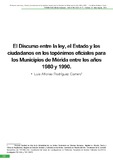| dc.rights.license | http://creativecommons.org/licenses/by-nc-sa/3.0/ve/ | |
| dc.contributor.author | Rodríguez Carrero, Luis Alfonso | |
| dc.date.accessioned | 2017-02-20T17:01:40Z | |
| dc.date.available | 2017-02-20T17:01:40Z | |
| dc.date.issued | 2015-05 | |
| dc.identifier.issn | 0798-3069 | |
| dc.identifier.uri | http://www.saber.ula.ve/handle/123456789/43059 | |
| dc.description.abstract | La toponimia en Venezuela es reflejo de la pluriculturalidad de país, así cada región
tiene sus características propias, como parte de esa sociedad y cultura que lo ha definido en su devenir. La presente investigación tiene como temporalidad de estudio el hecho histórico que se marca en la erección de los municipios y el posicionamiento de los
nombres de esos municipios en el colectivo entre las décadas de 1980 y 1990. La metodología propuesta es a partir de los tres discursos planteados por Michel Foucault
(1984) que expresan: la ley, el Estado y el sujeto, donde se refleja el código establecido, quienes lo establecen y el receptor de ese código, quien comúnmente lo trasgrede. Así, para la obtención de datos se opta por la revisión de fuentes legales y discursos oficiales para finalmente aplicar encuestas a sujetos que son referencias de esos espacios. El resultado alcanzado muestra que, el Estado es el primero en trasgredir el
código, el sujeto-ciudadano no lo asimilan como propio esos topónimos, por consiguiente
es un código que se crea y se recrea. | es_VE |
| dc.language.iso | es | es_VE |
| dc.rights | info:eu-repo/semantics/openAccess | |
| dc.subject | Toponimia | es_VE |
| dc.subject | Venezuela | es_VE |
| dc.subject | Discursos | es_VE |
| dc.subject | Sujeto | es_VE |
| dc.subject | Poder | es_VE |
| dc.title | El Discurso entre la ley, el Estado y los ciudadanos en los topónimos oficiales para los Municipios de Mérida entre los años 1980 y 1990. | es_VE |
| dc.title.alternative | The Discourse between the law, the State and the citizens in the official place-names for the municipalities of Mérida between the years 1980 and 1990. | es_VE |
| dc.type | info:eu-repo/semantics/article | |
| dc.description.abstract1 | Place names in Venezuela reflects the multicultural country, each region has its own characteristics, as part of that society and culture that has defined his growth. The
present research has as timing study the historical fact of municipalities’ development and the positioning of their names in the group between the 1980s and 1990. The proposed methodology is based on the three speeches presented by Michel Foucault (1984) expressing: the law, the State and subject, where the code set is reflected, those who set and the receiver of that code, who commonly transgresses it. So then, to obtain data you opt for the review of legal sources and official speeches to finally apply inquests to subjects who are references of those spaces surveys. The result obtained shows that the State is
the first to transgress the code, the subject-citizen does not assimilate as their own those place names, therefore it is a code that is created and recreated. | es_VE |
| dc.description.colacion | 101-109 | es_VE |
| dc.description.email | fermenta@ula.ve | es_VE |
| dc.description.frecuencia | Trimestral | |
| dc.identifier.depositolegal | 1991102ME302 | |
| dc.publisher.pais | Venezuela | es_VE |
| dc.subject.centroinvestigacion | Centro de Investigaciones en Ciencias Humanas (HUMANIC) | |
| dc.subject.facultad | Facultad de Humanidades y Educación | es_VE |
| dc.subject.idioma | es | |
| dc.subject.institucion | Universidad de Los Andes | es_VE |
| dc.subject.keywords | Toponymy | es_VE |
| dc.subject.keywords | Venezuela | es_VE |
| dc.subject.keywords | Speeches | es_VE |
| dc.subject.keywords | Subject | es_VE |
| dc.subject.keywords | Power | es_VE |
| dc.subject.seccion | Revista Fermentum: Artículos de Investigación | es_VE |
| dc.subject.thematiccategory | Artes y Humanidades | es_VE |
| dc.subject.tipo | Revistas | es_VE |
| dc.type.media | Texto | es_VE |


